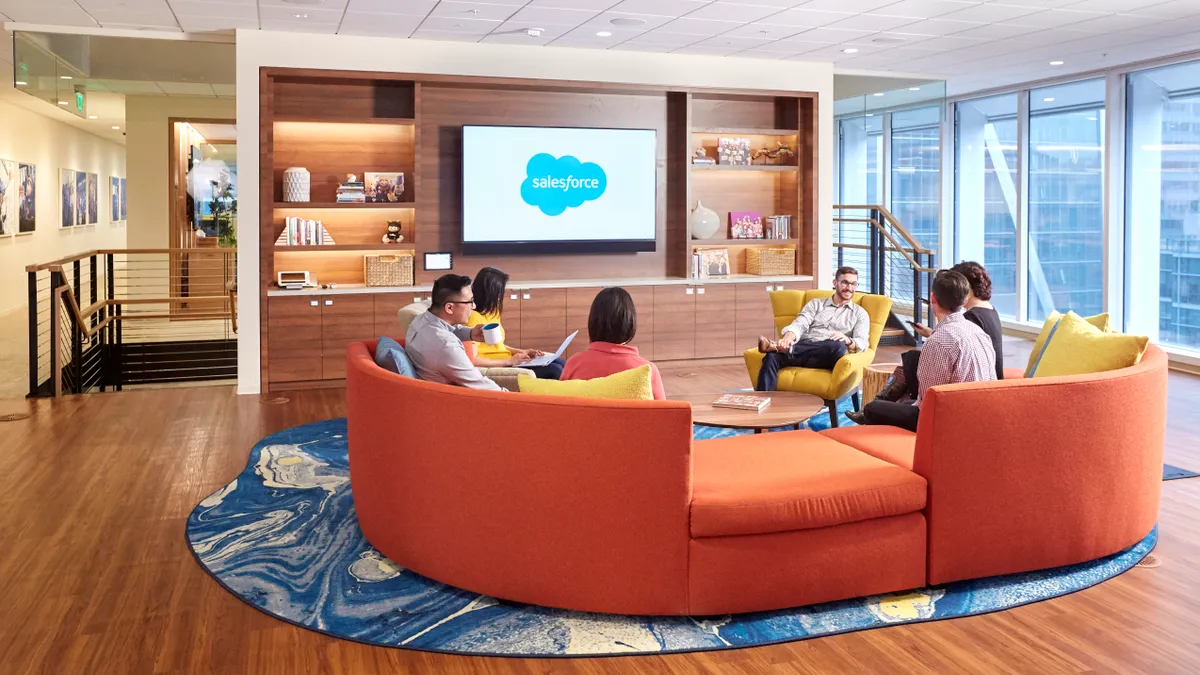Salesforce's Tableau acquisition, a deal welcomed by industry watchers and investors, was billed by Salesforce as a key step toward the expansion of its data analytics capabilities.
The $15.7B all-stock deal comes amid heightened interest across industries in what the company refers to as the "$1.8 trillion digital transformation space."
But the acquisition of Tableau, which the company completed Thursday, is just one element in the company's broader strategy: Salesforce is hoping to convince customers it can be a unifying tool that reframes the way businesses operate.
"Their main focus is to be an insights-driven platform for all things customers," said Liz Herbert, VP and principal analyst at Forrester, in an interview with CIO Dive.
A crowded field
Salesforce's branding around customer centricity ("Customer 360," the company calls it) signals an ambition to deliver a cohesive platform to industries that crave modernization.
That includes customer relationship management, e-commerce and other products in the context of an intelligent cloud-based, data-rich platform, Herbert said. Though Salesforce is a runaway winner in the evolving CRM market — an accolade it earned by using cloud as a key differentiator — it faces competition from the biggest names in tech as its offerings expand.
As customers seek infrastructure, business applications, data analytics, and efficiency solutions, Microsoft for example comes to the field with a product for each of those spaces, Boris Evelson, VP and principal analyst at Forrester, told CIO Dive.
Google, following its acquisition of data analytics platform Looker, brought Google Cloud, Google Apps and Google Analytics to customers, though it lacks a CRM tool. That acquisition, a $2.6-billion deal that will roll Looker into Google Cloud, was also about offering customers a deeper data analytics layer, according to Google Cloud CEO Thomas Kurian.
Amazon, too, is a contender in the digital transformation space. Already a leader the cloud market, it has some analytics capabilities by way of Amazon Athena.
Interoperability wins the game
To efficiently reach industry decision-makers, Salesforce's pitch must be able to soar above its competitors.
In a competitive climate, interoperability can be a key selling point for Salesforce, said Mukul Krishna, digital media global head of practice at Frost & Sullivan, in an interview with CIO Dive.
"You have to convince customers that you have the 'easy button,'" said Krishna. "That you'll be able to plug into their systems, onboard customers really fast and have a flexible pricing model. That's what it needs to bring to the market."
The move fits a broader trend in the tech industry: Leaders realize software platforms can't be everything to every customer, and interoperability can potentially lead to more efficient outcomes. "Everyone is a realist right now," Krishna said. "People have a more pragmatic view, where they realize they have to partner with companies they may be competing with."
In some ways there's more cooperation than competition, Herbert said.
Though Amazon and Salesforce don't have a lot of overlap, they've become good partners, mainly through an infrastructure "global alliance" that lets Salesforce integrate with Amazon Web Services. Even though an ecosystem strategy solves for today's landscape, there could be advantages down the line for companies who are able to approach their customers needs end-to-end, Herbert said.













